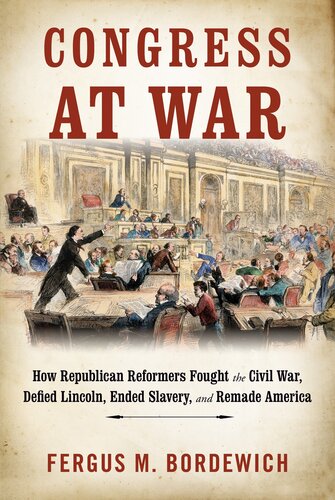
Congress at War
How Republican Reformers Fought the Civil War, Defied Lincoln, Ended Slavery, and Remade America
کتاب های مرتبط
- اطلاعات
- نقد و بررسی
- دیدگاه کاربران
نقد و بررسی

November 15, 2019
Abraham Lincoln led the nation, but Congress actually directed the Civil War; this fine history describes how. Veteran historian Bordewich (The First Congress: How James Madison, George Washington, and a Group of Extraordinary Men Invented the Government, 2016, etc.) writes that it was our elected legislators that raised an immense army, enacted the first draft, and pushed a reluctant Lincoln for "more aggressive generals, a harsher strategy against the South, and the recruitment of African Americans." Congress financed the war and in the process created a national currency. Furthermore, "long before Lincoln became willing to contemplate the emancipation of slaves, members of Congress demanded it, enacting an incremental series of laws that turned abolitionism from a fringe belief into public policy." Looking to the future, it passed the Homestead Act, the Pacific Railway Act to build the transcontinental railroad, and the Land-Grant College Act, which created the state university system. A skilled storyteller, Bordewich builds his narrative around four congressmen. Perhaps his hero is Rep. Thaddeus Stevens, who, almost unique for his time, considered blacks the equal of whites. The others are Sen. Ben Wade of Ohio; William Fessenden of Maine, a conservative who gradually became militant; and Rep. Clement Vallandigham, a Northern Democrat sympathetic to the South with offensive racial views but considerable public support. Despite the absence of Southern members, Congress was not a like-minded body, and Bordewich delivers a steady stream of colorful, bitter, sometimes-humorous stories of the abuse that lawmakers exchanged, much of which--unlike more recent debates--led to useful legislation. Lincoln biographers portray him as a shrewd statesman in touch with public opinion but harassed by radical lawmakers. Bordewich's Congress is on the side of the angels. Unlike the cautious president, Congress began in 1861 to foreshadow emancipation and showed less tolerance for phlegmatic generals who feared its Joint Committee on the Conduct of the War far more than their commander in chief. A riveting history of the Civil War that argues convincingly that Congress got it right.
COPYRIGHT(2019) Kirkus Reviews, ALL RIGHTS RESERVED.

December 9, 2019
Historian Bordewich (The First Congress) delves deeply into Radical Republicans’ determination to outlaw slavery and establish Congress as the most powerful government branch in this packed political history of the Civil War. Bordewich’s carefully documented narrative centers on such lawmakers as Thaddeus Stevens, William Pitt Fessenden, and Benjamin Wade, arguing that they coerced President Lincoln into issuing the Emancipation Proclamation that freed slaves in Confederate states. While Lincoln, who receives little sympathy in Bordewich’s account, tried to ameliorate slave owners’ concerns in order to preserve the Union, Radical Republicans pushed for abolition, suffrage, and punishment for the South. Stevens threatened to arm former slaves, while Wade, who often carried “a rifle-cane and a pair of pistols,” documented atrocities against black Union soldiers and pushed for Congress’s authority to oversee Reconstruction. Meanwhile, pro-slavery Ohio Democrat Clement Vallandigham demanded an immediate armistice and put forth, in Bordewich’s view, a “wartime defense of civil liberties” that might have been celebrated in another era, were it not undermined by his “vicious racism and reactionary politics.” Bordewich offers a unique and colorful perspective on the Civil War, and regularly manages to make congressional minutiae entertaining. Readers seeking fresh insight into the era will be satisfied.

January 1, 2020
The latest work by Bordewich (The First Congress) offers insight into the overlooked legislative conflicts during the Civil War, deftly following legislators Thaddeus Stevens, Benjamin Wade, William P. Fessenden, and Clement Vallandigham, and bringing to life the personalities behind factions of Radical Republicans, Unionists, and Copperheads. Bordewich expertly shows how each faction wrestled with funding, equipping, and supplying manpower to what turned out to be a long and expensive war, and whether to authorize military enlistment and extend rights to African Americans. Also explained is the impact of Congress issuing the first paper currency, authorizing banks to facilitate bond issuance in order to finance unprecedented war debt. During this time, the nation saw the passage of the Homesteading Act and the Pacific Railroad Acts, legislation that would impact the United States for generations. The outcome of the struggle in Congress was as consequential as the military struggle on battlefields throughout the county. VERDICT Bordewich contributes an entertaining, fresh perspective to our ever-evolving understanding and discussion of the Civil War. An important addition for both general readers of American history and scholars of the growing interpretations of Civil War studies.--John Muller, Dist. of Columbia P.L.
Copyright 2020 Library Journal, LLC Used with permission.

January 1, 2020
Veteran historian Bordewich (America's Great Debate, 2012) examines the work of the U.S. Congress during the Civil War through the lens of four legislators: radical representative Thaddeus Stevens of Pennsylvania, Senator Benjamin Wade of Ohio, conservative senator William Pitt Fessenden of Maine, and Ohio representative Clement Vallandigham, a leader of the Copperhead faction of antiwar Democrats. Bordewich points out that at the beginning of the Civil War, which each side expected to win easily, the newly established Republicans had little experience in governing. The war created problems at once: recruitment, raising funds, property, slavery, and states' rights issues. They understood, however, that the war was ultimately being fought about slavery. Perhaps because it lacked Southern opposition, the 37th Congress was still, was, Bordewich argues, a particularly productive congress, not only winning the war, but also, along the way passing major legislation concerning land-grant colleges, homesteading, and banking, and, with the Thirteenth Amendment, paving the bumpy way toward reconstruction. A revealing analysis of the relationships of Congress, President Lincoln, and the American people.(Reprinted with permission of Booklist, copyright 2020, American Library Association.)

























دیدگاه کاربران